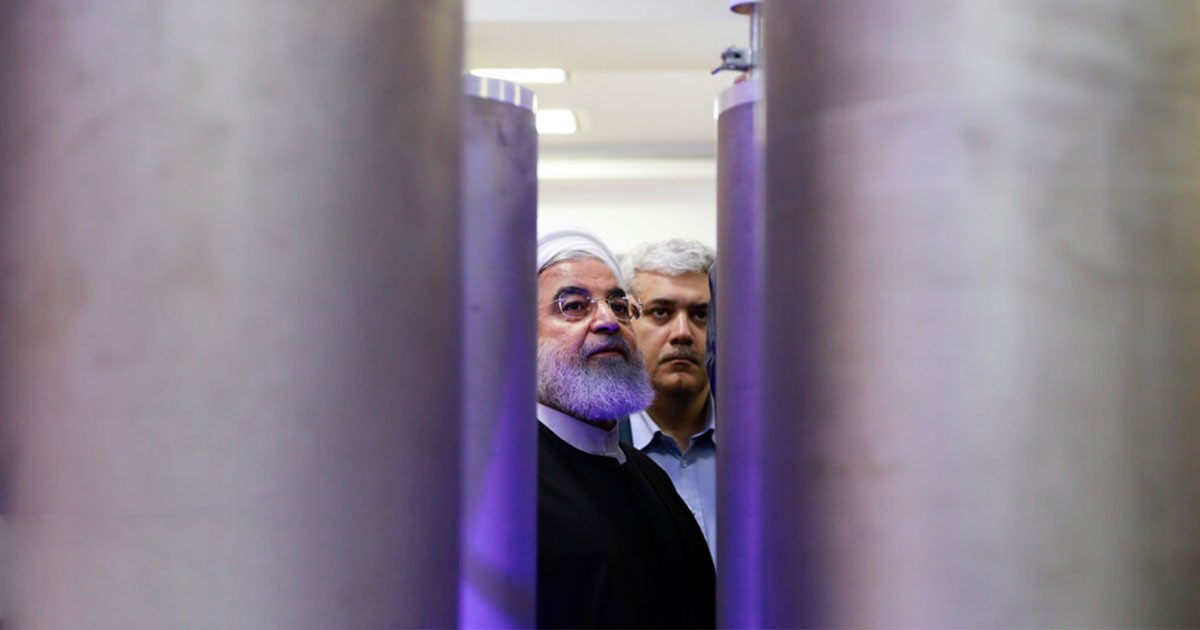News Analysis |
Spokesperson of Iran’s Atomic Energy Agency (AEOI) has said that Iran is constantly increasing the stockpile of low-enriched Uranium and soon it will surpass the ceiling limit sanctioned by the Joint Comprehensive Plan of Action (JCPOA) or, as commonly known, Iran’s nuclear. “We will go further from that ceiling, not only that but we will also increase production drastically.
After we pass the limit of 300kg the pace and the speed of enriched uranium production at the lower rate will also increase,” Behrouz Kalmavandi said in a statement. Iran’s economy is in shambles after President Donald Trump walked out of JCPOA and re-enacted the economic sanction over Iran for its strategic outstretch in the Middle East and ballistic missile program.
After years of deliberations, the first time in history, a country was stopped from making a nuclear bomb via peaceful means in the form of JCPOA.
European signatories of the nuclear deal, Germany, France, and the U.K. tried to salvage the agreement but the threats from Trump’s administration were too real to be ignored. Eventually, Iran found no other resort but to scale back its commitment toward the nuclear deal and announced that it will start enrichment of Uranium if rest of the signatories does not come to pull its economy out of trouble.
Read more: Iran to surpass uranium stockpile despite American sanctions
Pressure tactics
It is a common understanding that no country in the world goes on to flaunt their ambitions of using the nuclear program for military purpose. The threat of nuclear proliferation in Southwestern Asia was real a few days back, if Iran would have been successful in making the bomb then Saudi Arabia would also have pursued it any cost. But, as of now, when Iran’s economic condition is not healthy enough to support a program of making a nuclear bomb, the nuclear hazard has come down considerably.
The open admission of enriching the Uranium, therefore, is nothing more than a pressure tactic to push Europe decisively to aid Iran in troubling times, as it was offered in the nuclear deal. The recent visit of the German Foreign minister culminated in good news for Iran as Europe is proposing a trade mechanism which would be able to bypass the U.S sanctions.
Read more: US-Iran conflict intensifies: who is to blame?
Surveillance of Iran’s nuclear program could get difficult now
Under JCPOA, Iran agreed to cut down its stockpile of uranium and heavy water, both essential part of the weapons-grade fissile material and allowed International Atomic Energy Agency (IAEA) frequent visits to ensure the compliance. Over the years, IAEA reported that Iran has abided by the terms of the agreement, and even continued to do so months after the United States walked out of the deal.
It is a common understanding that no country in the world goes on to flaunt their ambitions of using the nuclear program for military purpose.
However, theoretically speaking, if Iran does manage to get over the financial constraints and European signatories fail to address its concerns, Iran will start its nuclear program all over again which will make it very difficult to trace the progress Iran is making toward the nuclear bomb. Under JCPOA, the country has agreed to 3 levels of IAEA inspection. First one is the generic safeguard inspection which IAEA carries out in all countries that have nuclear power plants.
Read more: Iran warned by Germany to stick to nuclear deal
The second is additional safety measures agreed in 1997 but most important is the third level of safeguard in which IAEA continuously monitors the nuclear plan via novel technology. In the absence of nuclear deal arrangements, Iran is liable only to the first level, standard IAEA inspections which can easily be evaded.
After years of deliberations, the first time in history, a country was stopped from making a nuclear bomb via peaceful means in the form of Joint Comprehensive Plan of Action (JCPOA). It was a collective global feat but unfortunately, it was undermined for trivial strategic objectives. However, it can still be amended as the situation has not escalated beyond the point of no return, although it would need sincere efforts and will on all sides.














